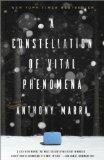Summary | Excerpt | Reading Guide | Discuss | Reviews | Beyond the Book | Readalikes | Genres & Themes | Author Bio

At the end of the village, where the forest narrowed on the road, they passed a meter-tall portrait nailed to a tree trunk. Two years earlier, after forty-one of the villagers had disappeared in a single day, Akhmed had drawn their forty-one portraits on forty-one plywood boards, weatherproofed them, and hung them throughout the village. This one was of a beautiful, self-admiring woman whose second daughter he had delivered. Despite his hounding her for years, she never had paid him for the delivery. After she was abducted, he had decided to draw on her portrait a single hair curling from her left nostril. He had grinned at the vain woman's ghost and then made peace with it. She looked like a beheaded giantess staring from the trunk. Soon she was no more than two eyes, a nose, and a mouth fading between the trees.
The forest rose around them, tall skeletal birches, gray coils of bark unraveling from the trunks. They walked on the side of the road, where frozen undergrowth expanded across the gravel. Here, beyond the trails of tank treads, the chances of stepping on a land mine diminished. Still he watched for rises in the frost. He walked a few meters ahead of the girl, just in case. He remembered another joke, this one about a lovesick commissar, but decided not to tell it. When she began straggling, he led her five minutes into the woods to a felled log unseen from the road. As they sat down, she asked for her blue suitcase. He gave it to her and she opened it, taking a silent inventory of its contents.
"What's in there?" he asked.
"My souvenirs," she said, but he didn't know what she meant. He unwrapped a hunk of dry black bread from a white handkerchief, split it in two uneven pieces, and gave her the larger one. She ate quickly. Hunger was a sensation so long situated in his abdomen he felt it as he would an inflamed organ. He took his time, tonguing the pulp into a little oval and resting it against his cheek like a lozenge. If the bread wouldn't fill his stomach, it might at least fill his mouth. The girl had finished half of hers before he took a second bite.
"You shouldn't rush," he said. "There are no taste buds in your stomach."
She paused to consider his reasoning, then took another bite. "There's no hunger in your tongue," she mumbled between chews. Her cupped hand caught the crumbs and tossed them back in her mouth.
"I used to hate black bread," he said. When he was a child he would only eat black bread if it was slathered in a spoonful of honey. Over the course of a year, his mother weaned him from it by slicing larger pieces, until his breakfast consisted of a small, sad oasis of honey on a desert of black bread.
"Can I have yours, then?"
"I said used to," he said, and imagined a brimming jar of honey, standing on a counter without a breadboard in sight.
She dropped to her knees and examined the underside of the log. "Will Ula be all right alone?" she asked.
His wife wasn't all right alone, with him, with anyone. He believed she had, in technical terms, lupus coupled with early-onset dementia, but in practice her nerves were so crisscrossed that her elbows ached when she spoke and her left foot had more sense than her brain. Before leaving that morning he had told Ula he would be gone for the day. As she gazed at him through her blank daze, he felt himself as one of her many visions, and he held her hand, and described from memory the placid pasture of a Zakharov oil painting, the herb garden and the cottage, until she fell back asleep. When she woke again that morning would she still see him sitting on the bed beside her? Perhaps part of him was still there, sitting on the bed; perhaps he was something she had dreamed up.
Excerpted from A Constellation of Vital Phenomena by Anthony Marra. Copyright © 2013 by Anthony Marra. Excerpted by permission of Hogarth, a division of Random House, Inc. All rights reserved. No part of this excerpt may be reproduced or reprinted without permission in writing from the publisher.
Your guide toexceptional books
BookBrowse seeks out and recommends the best in contemporary fiction and nonfiction—books that not only engage and entertain but also deepen our understanding of ourselves and the world around us.